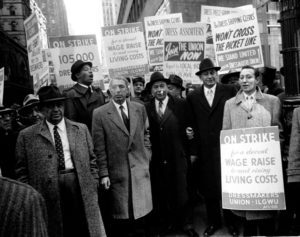
Unions and Informational Picketing – Know the facts
Introduction Union and Informational picketing is a form of non-strike activity that allows unions and their members to express their views on working conditions and

Introduction Union and Informational picketing is a form of non-strike activity that allows unions and their members to express their views on working conditions and

The main difference between fair share and right-to-work states is whether workers must pay union dues in order to receive these benefits from their employers.

Right-to-work laws are in place in 26 states. The laws allow employees who work under union contracts not to pay union dues. Some argue that this allows them more freedom when it comes time to negotiate salaries with their employers while others say it gives employees less power to improve their workplace conditions because they have less support from unions.

Right to work laws (RTW) are legislation passed at state level in the United States that prohibit mandatory union membership and the payment of dues as a condition of employment. The laws may also prevent employers from requiring employees to accept a contract or a particular form or kind of collective bargaining agreement.

ESGR – the Employer Support of Guard and Reserve it is designed to help the soldier airmen or marine to navigate their employee rights.

India has seen that there is a large number of employees in India. India is a growing and complex Nation. The County is well on its way to continue to see growth.

Labor unions in Mexico have a long, turbulent history. The country’s current labor laws need to be amended to protect the rights of workers and make them more transparent.

Introduction The United States-Mexico-Canada Agreement (USMCA) was negotiated to modernize and update the North American Free Trade Agreement (NAFTA). As part of this effort, Mexico’s

Labor relations can be a contentious issue, but it doesn’t have to be. By investing in your labor relations program and improving employee engagement, you can improve productivity, morale, and turnover rates. Here are five ways you can begin tackling issues head-on:

The main takeaway from this article is that a strike is a powerful tool for workers to use. It is a form of direct action, but it can also be used as a way to put pressure on management in order for them to concede more favorable terms. Before you go out and join the picket line with your fellow employees, there are some things you need to know about strikes so that they don’t get out of hand
